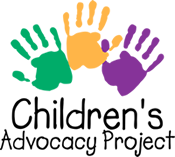Forensic interviews are usually the first step at the Children’s Advocacy Project. When there is suspected child abuse or maltreatment, it is the job of the forensic interviewer to have a conversation with the child to elicit detailed information about the possible events.
Forensic interviews must be “developmentally sensitive,” meaning that questions are to be phrased based on a child’s level of development and linguistic skills. Forensic interviewers are specially trained in interviewing children in a way that is not leading or suggestive.
The Children’s Advocacy Project has three trained forensic interviewers working to:
-
obtain information from the child that might be helpful to a criminal investigation
-
to assess the safety of the child’s living arrangements
-
to obtain information that will either corroborate or refute allegations or suspicions of abuse and neglect
-
to assess the need for medical treatment and psychological care.
Forensic interviews at the Children’s Advocacy Project are recorded and reviewed by our multidisciplinary team and provided to law enforcement. Ultimately, the result of a forensic interview with a child may help determine whether to bring criminal charges against an individual suspected of physically or sexually abusing the child, neglecting the child, or any other criminal offense. It is imperative that interviews of children are conducted in an unbiased fashion that follows best-practice standards in order for a case to hold up in court.
When forensic interviews are conducted properly, they can help the Children’s Advocacy Project, the District Attorney, Law Enforcement, and Department of Family Services to better understand the situation the child is in. Ultimately helping the team understand how to move forward with care for the child and the family, how to proceed with a case, and how to begin helping the child heal.


